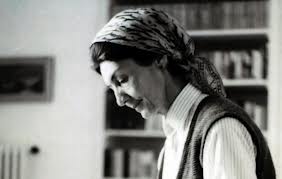Shirley
Hazzard is one of those writers who can skirt the borders of literary
pretension and get away with it due to her beautiful writing style and her
subtle skill with narrative form. Hazzard also has a splendid way of making an
obtuse plot inviting, making The Transit of Venus a master class of
highly literate writing that even those who feel most comfortable with so
called genre novels can easily read and enjoy.
Hazzard
is an Australian ex-pat who left the country in 1947 at the age of sixteen and
as far as I can ascertain has never returned. She began the life of a writer in
the early 1960’s when she submitted a short story that she’d written for her
own enjoyment to The New Yorker and it was published. Since then there has been
short story collections, non-fiction and four novels. Although Hazzard is not
prolific, there was a gap of twenty-three years between Transit and The
Great Fire
(2003); she makes up for it with her sheer class.
The
Transit of Venus is, on the surface, a story about two orphaned Australian sisters,
Caroline and Grace Bell, who end up living in 1950’s England. The narrative
takes place over four decades and follows their lives and, most significantly,
their relationships. Love, with all its triumphs and tragedies, is central to
the novel. Caroline has many suitors but it is her unrequited relationship with
the long-suffering Astronomer Edmund Tice that gives the novel romantic
tension. Using the actual transit of Venus as an analogy for the vagaries of
romance, Hazzard milks it for all it’s worth. She suggests that like trying to
observe the transit of Venus, you need to be in the right place at the right
time to succeed romantically.
Thematically
The Transit of Venus tackles not just the nature of love, but also gender
politics, class, wartime morality and personal duplicity. One of the strengths
of the novel is Hazzard’s skill in bringing the time period of the 1950’s to
the 1980’s alive. The narrative is a superb blend of the personal and the
historical, each complimenting the other. There’s a great sequence in which she
describes a multitude of women across 1950’s London waking up and preparing
them-selves for a day’s work. These women represent the vanguard of working
women who weren’t going to waste the gender gains of WWII.
Hazzard’s
pose is dazzling, sophisticated and beautiful, allowing a special kind of
engagement between the reader and the narrative to develop. At times I felt
enraptured by her writing and as the novel unfolded the strength and subtlety
of the plot became readily apparent. Hazzard also drops a few strong hints
about how the novel ends early on and if you pay attention you will understand
the ending, otherwise you may be in for a re-read.
Hazzard’s
characters have a certain cold complexity, particularly Caroline, who maneuvers
through her relationships with a subtle cold detachment. Caroline’s sister,
Grace, mostly serves to underline the gender trap of domesticity, although she
does take the lead in a section filled with frustrated romantic yearnings. Her
husband, Christian Thrale, represents middle-class public servant
small-mindedness, something Hazzard herself was familiar with having worked for
the United Nations.
I
first read this novel way back in 1994 for a university unit on Australian
literature and it really opened my eyes to the possibilities of highly literate
fiction. My prior reading habits mainly included cult novels and science
fiction. Hazzard, with one novel, inspired me to move outside my comfort zone
and for that I’m grateful. Recently I read an interview
with Hazzard in the Guardian from 2006 and I realized that my conversion was no
coincidence. She has this to say about literature:
"The idea that somebody has expressed something, in a
supreme way, that it can be expressed; this is, I think, an enormous feature of
literature. I feel that people are more unhappy, in an unrealised way, for not
having these things in their lives: not being able to express something, or to
profit from somebody else having expressed it. It can be anything but it's
always, if it's supreme, an exaltation."
To
me this perfectly sums up just why fiction is just as important, if not more
so, than non-fiction when it comes to guiding us through this weird universe we
find ourselves in. Read The Transit of Venus and you’ll find out just why.


No comments:
Post a Comment